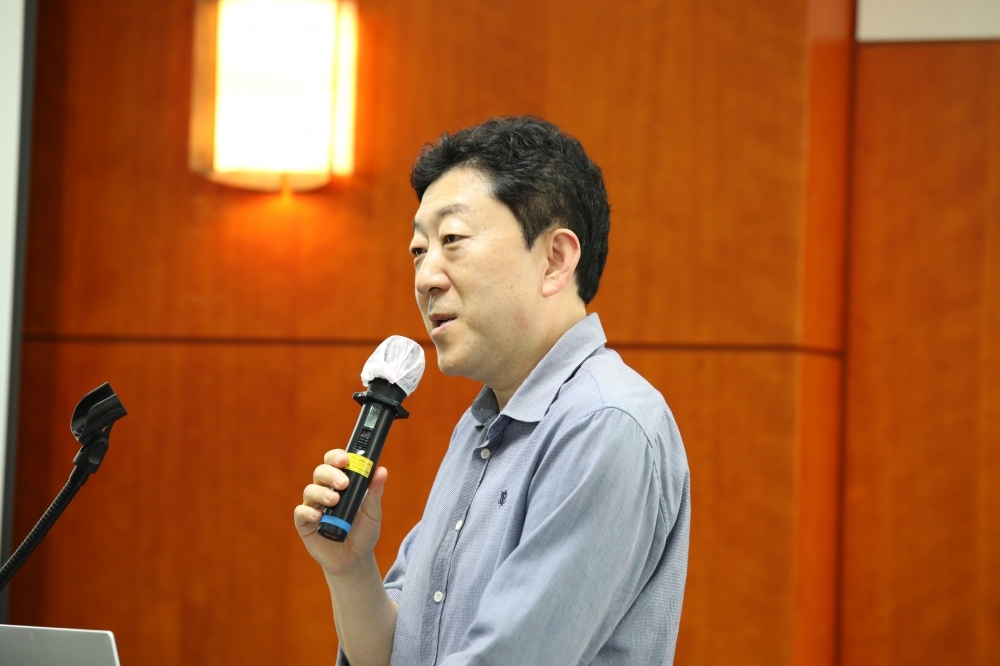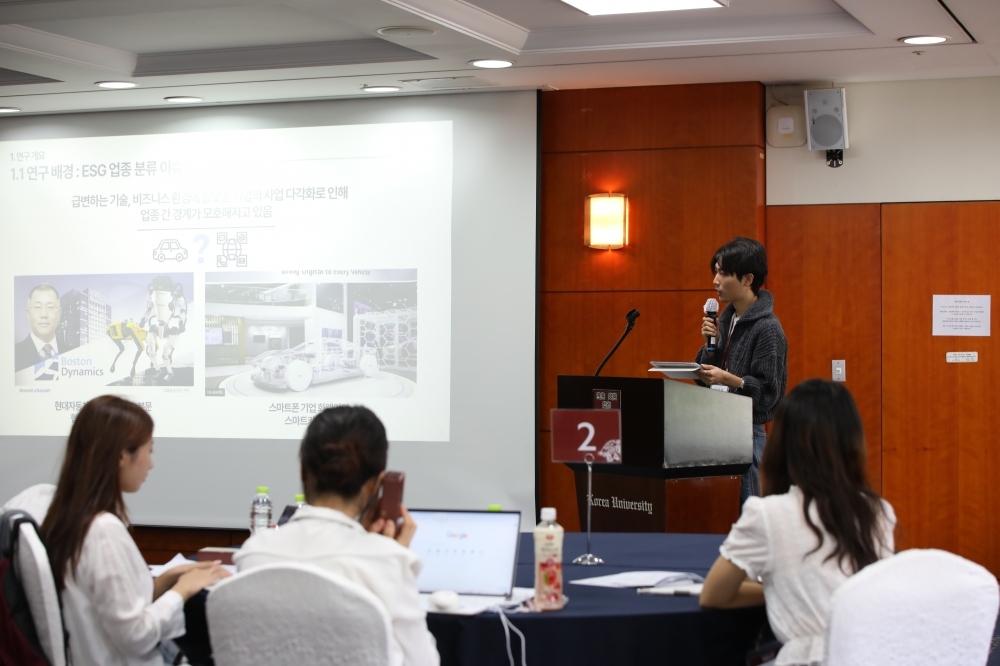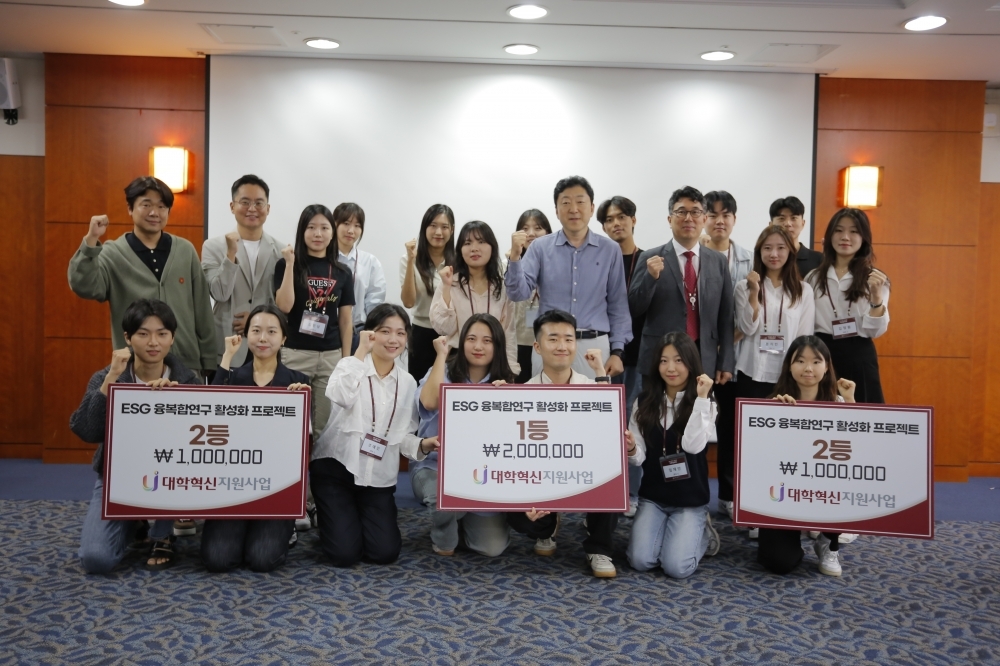News
KUBS News
Discussing ESG Strategies in the Pharmaceutical Industry" - ESG Research Competition Final Prese
2024.11.28 Views 2296 국제실
Discussing ESG Strategies in the Pharmaceutical Industry" - ESG Research Competition Final Presentation Successfully Concludes
On September 27, the final presentation of the "ESG Research Competition" was held at the Cuckoo Hall in the LG-POSCO Building. This year’s competition centered on the theme of "ESG in the Pharmaceutical Industry," with participating students refining their research based on feedback received during the interim presentation. A total of four teams presented their findings, discussing ESG strategies to enhance sustainability in the pharmaceutical sector from various perspectives. The event drew attention for its in-depth research and passionate presentations.

Team 2 presented on "The Current State of ESG in the Pharmaceutical and Biotech Industries" and "Circular Economy." Beginning with an explanation of the necessity of ESG practices tailored to the unique characteristics of the pharmaceutical industry, the team introduced key ESG initiatives and circular economy models. They then conducted a comparative analysis of ESG activities by domestic and international pharmaceutical companies, highlighting the pressing issue of unused medication disposal, which has become a significant challenge in the industry.
By addressing the practical challenges faced by domestic pharmaceutical companies, the team proposed improvements to current recovery policies and offered practical solutions. Their presentation concluded with a discussion of the difficulties encountered during the research process and the feedback they received. It was well-received for its meaningful contribution to conveying the importance of ESG practices and actionable strategies within the pharmaceutical industry.
Team 3's presentation focused on the theme of "Developing ESG Guidelines Specialized for Contract Manufacturing Organization (CMO) Businesses." The team began by outlining their research and highlighting limitations in the current ESG evaluation framework for the pharmaceutical industry. They pointed out that differing sub-sector classification systems across various evaluators create inconsistencies in ESG assessment criteria.
This inconsistency, they explained, can lead to confusion in the ESG evaluation results for companies. To address this issue, the team proposed the development of a specialized pool of ESG issues tailored to CMOs, providing a focused approach to resolving these challenges.

The team argued for the development of an ESG evaluation framework that reduces reliance on evaluators' subjective judgments and ensures higher reliability. Their presentation received positive feedback for proposing ESG evaluation guidelines tailored specifically to the unique CMO sector within the pharmaceutical industry. By emphasizing the need for ESG strategies optimized for the characteristics of this specialized field, the team highlighted a critical step toward advancing sustainable practices in the sector.
The final team, Team 4, presented on the topic of "Company-Specific Strategies for Reducing Greenhouse Gas Emissions in the Domestic Pharmaceutical Industry." They began by explaining the increasing importance of managing carbon emissions in the face of stricter greenhouse gas regulations, which served as the motivation for their research. Highlighting the growing significance of carbon management in the business operations of pharmaceutical companies, the team analyzed ESG activities of both domestic and international firms to identify the challenges and propose solutions for greenhouse gas emissions in the Korean pharmaceutical industry.
The team specifically proposed the standardization of carbon emission measurements and the prioritization of ESG initiatives, presenting concrete and actionable improvement strategies. Their presentation garnered significant attention for offering practical strategies to reduce greenhouse gas emissions, aligning with the growing emphasis on environmental responsibility within the pharmaceutical industry.
After all the team presentations concluded, the attending professors evaluated each team's work and provided detailed feedback. Ultimately, Team 1 was awarded first place, while Teams 2 and 3 tied for second place. Each team's research topics and presentations demonstrated creative and practical approaches to addressing ESG challenges in the pharmaceutical industry. Through the feedback received, participants further refined their research and gained a deeper understanding of the importance of ESG management.

To conclude the event, participants gathered for a group photo to commemorate the day's achievements. This final presentation served as a valuable opportunity for exploring various ESG strategies and actionable solutions for sustainable development in the pharmaceutical industry. It also provided students with a meaningful experience to showcase their creativity and research skills.


